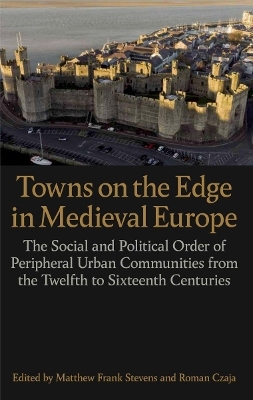
Towns on the Edge in Medieval Europe
Oxford University Press (Verlag)
978-0-19-726730-1 (ISBN)
In the later Middle Ages a European 'core' of culturally and administratively sophisticated societies with rapidly growing populations, on an axis from England to Italy, colonised the European 'periphery'. In northern Europe this periphery included Wales and Ireland, as colonised by the English, and Prussia and Livonia, as colonised (mainly) by Germanic and Nordic peoples. A key tool of colonisation was the chartered town, giving citizens distinguishing legal privileges and a degree of self-regulation. Towns on the Edge in Medieval Europe contends that while the chartered town, as a legal and social-political concept, was transferred to peripheral areas by colonisers, its implementation and adaptation in peripheral areas resulted in unique societies, not simply the replication of core urban forms and communities. In so doing, it compares the development of social and political institutions in the chartered towns of medieval Ireland, Wales, Prussia, and Livonia. Research themes include community formation, normalisation/social disciplining, and peace making/keeping.
Matthew Frank Stevens studied at Pennsylvania State University and the University of Wales, Aberystwyth, completing his PhD in medieval social and economic history in 2005. He is now an Associate Professor of history at Swansea University. He has been an Ulam fellow of the Polish National Agency for Academic Exchange, at Nicolaus Copernicus University, Toru?, an Eileen Power fellow of the Economic History Society, at Oxford University, and a research officer at the Institute of Historical Research, University of London. He is the author of numerous academic articles and two monographs: Urban Assimilation in Post-Conquest Wales: Ethnicity, Gender and Economy in Ruthin, 1282-1348 (2010) and The Economy of Wales, 1067-1536 (2019). Roman Czaja studied history at the Institute of History and Archives Sciences of Nicolaus Copernicus University, Toru?, completing his PhD. in the Department of Arts in 1991. He is now a Professor of history at NCU, holding the Chair of Medieval History and Auxiliary Sciences of History. A fellow of the Alexander von Humboldt Foundation at Humboldt Universität and Freie Universität in Berlin, in 2018 he was honoured by the University of Debrecen with the degree of Doctor Honoris Causa. He is author of over 250 research articles and of five books. In 2008 he published Grupy rz?dz?ce w miastach nadba?tyckich w ?redniowieczu (Ruling Groups in the Cities of the Baltic Zone in the Middle Ages) with Nicolaus Copernicus University Press.
1: Introduction
2: The place of native populations in the chartered towns of conquered regions: Wales and Prussia as a comparative case study
3: 'Irishtowns' and 'Welsh Streets': ethnic enclaves within the towns of colonial Ireland and Wales in a northern-European colonial context
4: Women in the small-town economy of medieval Wales and Prussia
5: Urban legislation as an instrument for the formation and regulation of socio-economic life in 14th-century Prussian and Irish towns
6: The participation of craftsmen in municipal governance in late medieval Malbork and Stockholm
7: Shaping the public space of Danzig and Dublin
8: Military affairs and community in Prussian, Livonian and Irish towns, 13th-16th centuries
9: Quarters and Quartermasters in Franconian and Prussian Towns, 14th-16th Centuries: The Common People and Their Participation in Urban Governance
10: Maintaining a 'special relationship'? Petitions to the crown from Irish and Welsh towns, 13th -16th centuries
11: Conclusion
| Erscheinungsdatum | 19.04.2022 |
|---|---|
| Reihe/Serie | Proceedings of the British Academy |
| Zusatzinfo | 15 |
| Verlagsort | Oxford |
| Sprache | englisch |
| Maße | 161 x 240 mm |
| Gewicht | 584 g |
| Themenwelt | Geschichte ► Allgemeine Geschichte ► Mittelalter |
| Geisteswissenschaften ► Geschichte ► Regional- / Ländergeschichte | |
| Geschichte ► Teilgebiete der Geschichte ► Kulturgeschichte | |
| ISBN-10 | 0-19-726730-0 / 0197267300 |
| ISBN-13 | 978-0-19-726730-1 / 9780197267301 |
| Zustand | Neuware |
| Informationen gemäß Produktsicherheitsverordnung (GPSR) | |
| Haben Sie eine Frage zum Produkt? |
aus dem Bereich


